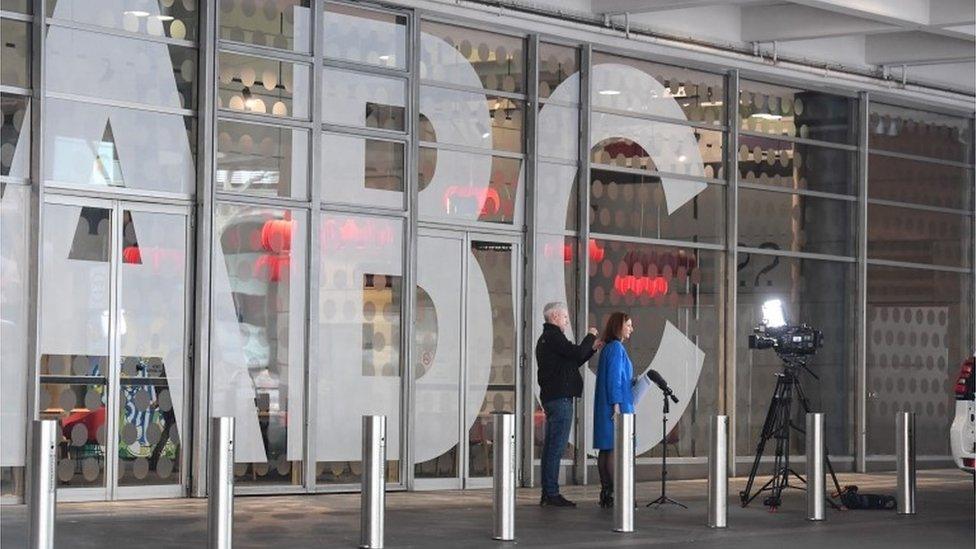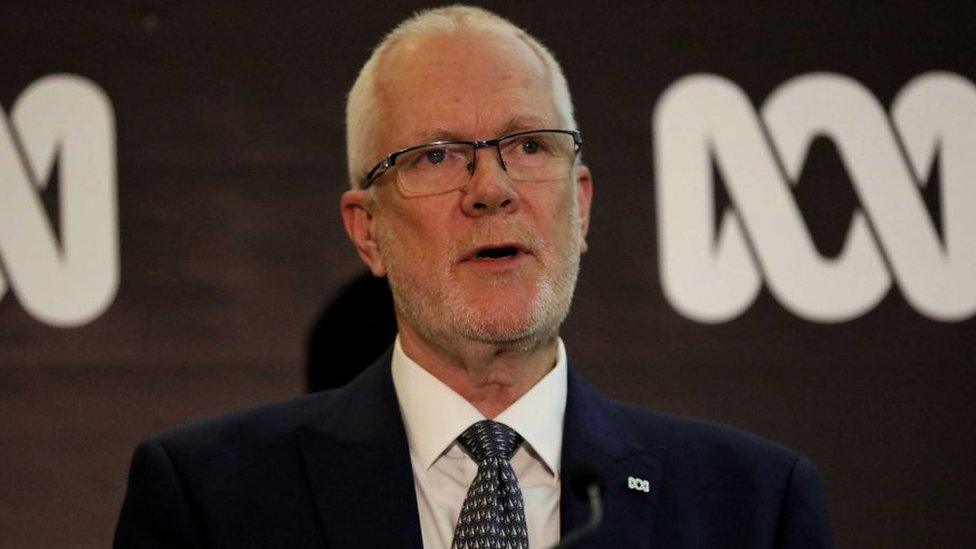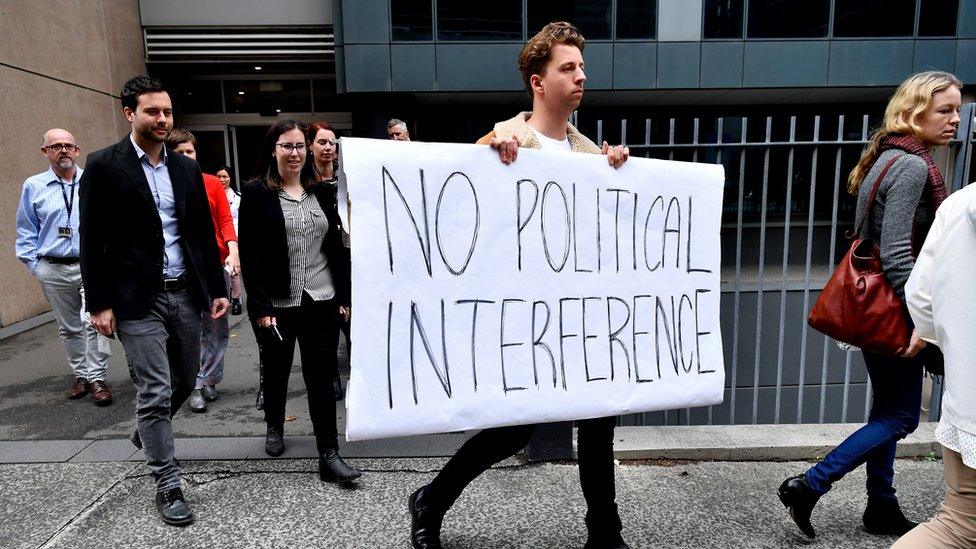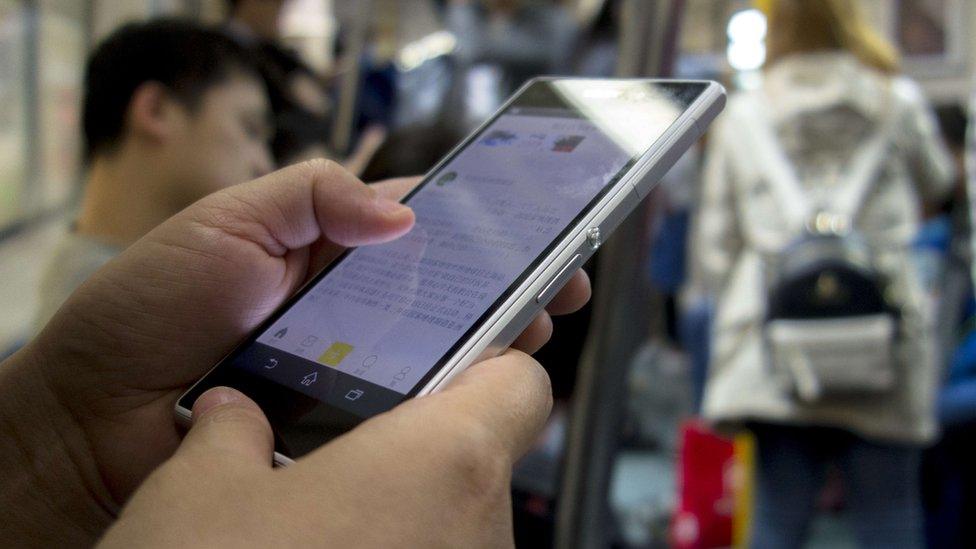ABC boss quits over Australian political interference claims
- Published

The ABC has lost its two main leaders - an editor-in-chief and chairman - in the past week
Australia's national broadcaster is facing a leadership crisis following allegations of political interference.
Justin Milne resigned as chair of the Australian Broadcasting Corporation (ABC) on Thursday, amid allegations he tried to fire journalists who were "hated" by the Australian government.
Mr Milne has denied the reports, saying he was leaving to relieve pressure around the public broadcaster.
The government has also denied pressuring the broadcaster over staff.
Managing director Michelle Guthrie was fired by the ABC board on Monday.
What was Milne accused of?
He allegedly told Ms Guthrie to sack two senior journalists whose reports drew complaints from the government.
In one leaked email about economics journalist Emma Alberici, he allegedly wrote: "They hate her... get rid of her. We need to save the ABC, not Emma."

Justin Milne was accused of compromising the ABC's independence
In another reported exchange, he directed the managing director to "shoot" the ABC's political editor, Andrew Probyn.
The messages were leaked to Australian news outlets just a day after Mr Milne, in charge of the ABC board, sacked Ms Guthrie halfway through her five-year term.
Mr Milne said on Thursday: "Nobody from the government has ever rung me and told me what to do in relation to the ABC."
Why is this a problem?
Like the BBC, the ABC is funded by public money, but has its editorial independence protected by a legislated charter.
The broadcaster has a legal duty to present news in an impartial manner, free from political bias or influence.

ABC journalists walked out of newsrooms on Wednesday in protest
In recent years, it has been criticised by the centre-right Liberal National government for "inaccurate reporting" and alleged bias in some of its stories.
So reports that Mr Milne, a former business partner of ex-prime minister Malcolm Turnbull, sought to remove journalists behind those stories to appease Canberra, prompted wide anger.
It led to staff protests across the country, and the government to announce an inquiry into the interference claims.

Public faith compromised
Hywel Griffith, BBC News, Sydney
Affectionately known as Aunty by its viewers, the ABC holds an unique place in Australian life.
It no longer has the biggest audiences nor the most high-profile presenters, but it does retain the best trust ratings of any media organisation.
And so the suggestion that it would hire and fire journalists according to who the government favours has caused outrage.
Even though the reporters in question were not sacked, public faith in the corporation was compromised and the chairman had to go.
At a time when its funding is being cut, the confidence of the audience is an even more precious commodity.
The challenge for the ABC now is to find new leaders who can show it remains fiercely independent.

What's been the reaction?
The broadcaster's union, which led staff protests earlier in the week, welcomed Mr Milne's exit.
Allow X content?
This article contains content provided by X. We ask for your permission before anything is loaded, as they may be using cookies and other technologies. You may want to read X’s cookie policy, external and privacy policy, external before accepting. To view this content choose ‘accept and continue’.

However, some have also called for the rest of the board to go. All of the directors, except one elected by the staff, are appointed by the government.
Allow X content?
This article contains content provided by X. We ask for your permission before anything is loaded, as they may be using cookies and other technologies. You may want to read X’s cookie policy, external and privacy policy, external before accepting. To view this content choose ‘accept and continue’.

The government has resolutely denied pressuring the broadcaster over its editorial stance.
Prime Minister Scott Morrison welcomed Mr Milne's exit on Thursday, saying it was time for the ABC to "resume normal transmission".
Allow X content?
This article contains content provided by X. We ask for your permission before anything is loaded, as they may be using cookies and other technologies. You may want to read X’s cookie policy, external and privacy policy, external before accepting. To view this content choose ‘accept and continue’.
- Published3 September 2018
